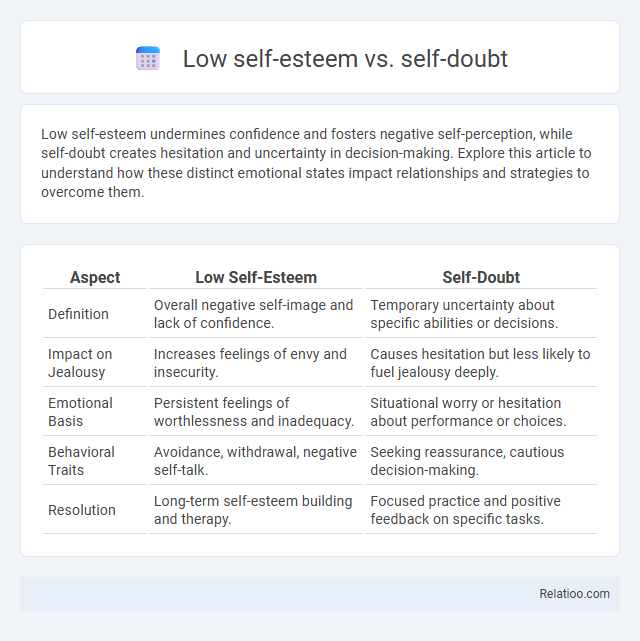Low self-esteem undermines confidence and fosters negative self-perception, while self-doubt creates hesitation and uncertainty in decision-making. Explore this article to understand how these distinct emotional states impact relationships and strategies to overcome them.
Table of Comparison
| Aspect | Low Self-Esteem | Self-Doubt |
|---|---|---|
| Definition | Overall negative self-image and lack of confidence. | Temporary uncertainty about specific abilities or decisions. |
| Impact on Jealousy | Increases feelings of envy and insecurity. | Causes hesitation but less likely to fuel jealousy deeply. |
| Emotional Basis | Persistent feelings of worthlessness and inadequacy. | Situational worry or hesitation about performance or choices. |
| Behavioral Traits | Avoidance, withdrawal, negative self-talk. | Seeking reassurance, cautious decision-making. |
| Resolution | Long-term self-esteem building and therapy. | Focused practice and positive feedback on specific tasks. |
Understanding Low Self-Esteem
Low self-esteem involves a pervasive negative evaluation of oneself, impacting overall confidence and self-worth, while self-doubt specifically refers to uncertainty about one's abilities or decisions. Understanding low self-esteem requires recognizing its deep-rooted effects on emotional well-being, behavior, and relationships. Addressing low self-esteem focuses on building a balanced self-image and promoting resilience against negative internal dialogues.
What Is Self-Doubt?
Self-doubt is the feeling of uncertainty about your abilities or decisions, often causing hesitation in pursuing goals. Unlike low self-esteem, which reflects a general lack of confidence in your overall worth, self-doubt specifically relates to questioning your competence in particular situations. Understanding self-doubt allows you to identify moments where hesitation is situational rather than a deep-rooted issue with your self-value.
Core Differences: Low Self-Esteem vs Self-Doubt
Low self-esteem reflects a pervasive negative evaluation of oneself, impacting overall self-worth and confidence, while self-doubt is a temporary uncertainty about specific abilities or decisions. Core differences lie in the scope and duration: low self-esteem is a chronic, wide-ranging issue affecting multiple life areas, whereas self-doubt is situational and often linked to particular challenges. Addressing low self-esteem requires long-term strategies fostering self-acceptance, whereas overcoming self-doubt involves building confidence through experience and evidence-based reassurance.
Root Causes of Low Self-Esteem
Low self-esteem originates from deep-rooted negative beliefs about one's worth, often stemming from childhood experiences, criticism, or neglect. Self-doubt is a situation-specific hesitation about one's abilities or decisions, whereas self-esteem encompasses the broader evaluation of self-worth. Addressing root causes like unresolved trauma, negative self-talk, and lack of positive reinforcement is essential for overcoming low self-esteem.
Common Triggers of Self-Doubt
Low self-esteem often stems from a persistent negative self-view, while self-doubt is a temporary uncertainty about one's abilities or decisions. Common triggers of self-doubt include fear of failure, perfectionism, and comparing your performance to others' achievements. Recognizing these triggers helps you build resilience and improve your confidence over time.
How Low Self-Esteem Manifests
Low self-esteem manifests through persistent negative self-perception, diminished confidence, and avoidance of challenges, often leading to social withdrawal and impaired decision-making. Unlike transient self-doubt, which involves momentary uncertainty about specific abilities or choices, low self-esteem is a pervasive sense of worthlessness affecting multiple aspects of life. Recognizing these differences helps in addressing emotional health by targeting underlying beliefs rather than surface-level uncertainties.
Recognizing Signs of Self-Doubt
Recognizing signs of self-doubt involves noticing frequent hesitation, constant second-guessing, and an overwhelming fear of making mistakes. Unlike low self-esteem, which reflects a broader negative self-view, self-doubt centers on specific moments of uncertainty about your abilities or decisions. Identifying these signs helps you address internal conflicts and build confidence in your personal and professional life.
The Impact on Daily Life and Relationships
Low self-esteem often leads to persistent feelings of inadequacy, resulting in withdrawal from social interactions and difficulty asserting personal needs, which strains relationships. Self-doubt causes hesitation and second-guessing in decision-making, reducing confidence in daily tasks and creating uncertainty that can frustrate communication with others. When self-doubt becomes chronic, it exacerbates low self-esteem, intensifying negative self-perceptions and further impairing both personal and professional relationships.
Strategies to Address Low Self-Esteem
Low self-esteem involves a pervasive negative evaluation of oneself, often leading to feelings of worthlessness, while self-doubt specifically refers to uncertainty about one's abilities or decisions. Strategies to address low self-esteem include cognitive-behavioral therapy (CBT) to challenge negative self-beliefs, practicing self-compassion to foster kindness towards oneself, and setting achievable goals to build confidence. Consistent reinforcement through positive affirmations and seeking supportive social environments also significantly contribute to improving self-esteem.
Practical Tips for Overcoming Self-Doubt
Low self-esteem involves a persistent negative view of your overall worth, while self-doubt is uncertainty about specific abilities or decisions. Practical tips for overcoming self-doubt include challenging negative thoughts with evidence, setting small achievable goals to build confidence, and seeking feedback from trusted sources. By actively practicing these strategies, you can strengthen your belief in your capabilities and reduce hesitation in your actions.

Infographic: Low self-esteem vs Self-doubt
 relatioo.com
relatioo.com